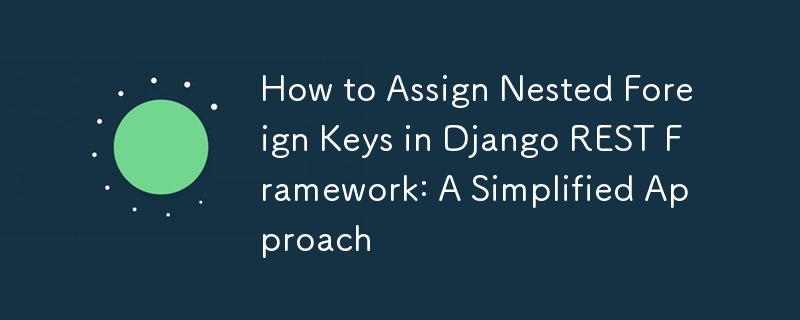Home >Backend Development >Python Tutorial >How to Assign Nested Foreign Keys in Django REST Framework: A Simplified Approach
How to Assign Nested Foreign Keys in Django REST Framework: A Simplified Approach
- Susan SarandonOriginal
- 2024-11-25 13:17:15464browse

Assigning Nested Foreign Keys: A Simplified Approach
Question
Model serializers in Django REST Framework handle foreign key relationships by allowing ID integers to be posted for assignment purposes. However, extending this behavior to nested serializers poses a challenge, especially when only assigning existing database objects.
Simplest Nested Solution
In the absence of out-of-the-box support, one can override to_representation() in the parent serializer to include the nested child data:
class ParentSerializer(ModelSerializer):
def to_representation(self, instance):
response = super().to_representation(instance)
response['child'] = ChildSerializer(instance.child).data
return response
This approach provides a simple and effective solution for both creating and reading parent instances with nested children.
Generic Approach
For more generalized handling, a custom serializer field can be utilized:
class RelatedFieldAlternative(serializers.PrimaryKeyRelatedField):
def __init__(self, **kwargs):
...
def use_pk_only_optimization(self):
...
def to_representation(self, instance):
...
By defining this field in the parent serializer and setting serializer to the child serializer class, foreign key assignment can be achieved using a single key:
class ParentSerializer(ModelSerializer):
child = RelatedFieldAlternative(queryset=Child.objects.all(), serializer=ChildSerializer)
The advantage of this generic method lies in its applicability to multiple serializers requiring this behavior, reducing the need for custom fields and methods for each.
The above is the detailed content of How to Assign Nested Foreign Keys in Django REST Framework: A Simplified Approach. For more information, please follow other related articles on the PHP Chinese website!

